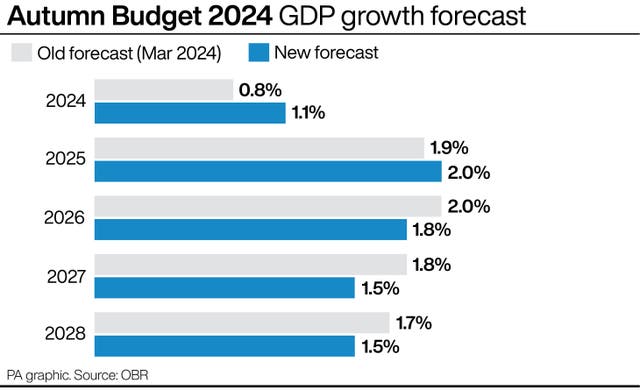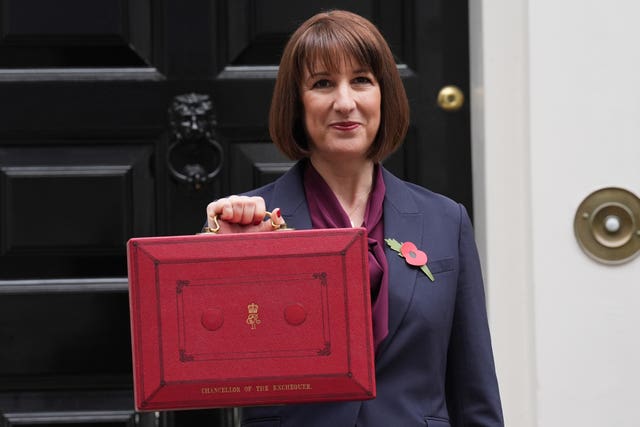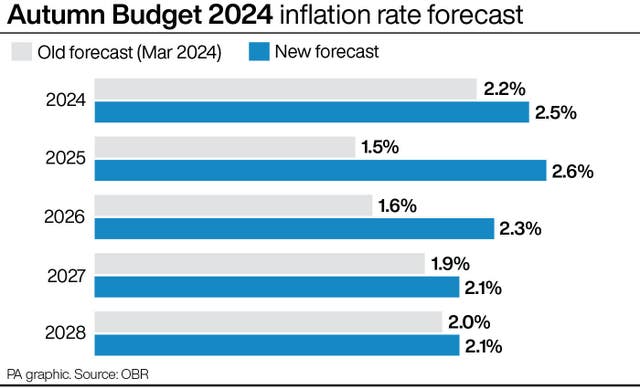Chancellor Rachel Reeves announced almost £70bn of extra spending each year, funded by business-focused tax increases and extra borrowing, in her first Autumn Budget.
The Office for Budget Responsibility (OBR) said the sharp increase in spending would contribute to higher inflation in the short term, although it would also help spur stronger economic growth.
OBR member David Miles said: “The inflation profile is slightly higher than it would be if there wasn’t quite a significant increase in spending.”

Inflation is expected to remain above the Bank of England’s 2% target until 2029, according to the latest forecasts, which upgraded their forecasts for the next four years.
This means that inflation is expected to average 2.5% this year and 2.6% next year.
The official forecaster said inflation would then ease, assuming “the Bank of England acts” to help reach the target rate.
The Bank of England has used higher interest rates in recent years to help reduce UK inflation after it jumped to 11.1% in 2022.
The interest rate, which helps dictate mortgage rates, is currently 5% after it was last cut in August by the bank’s policymakers.
Mr Miles said the OBR’s new inflation and borrowing forecasts – predicting the Chancellor would increase borrowing by £32bn a year – meant interest rates were likely to be 0.25 percentage points higher. than they would otherwise be in the coming years.
As a result, yields on UK government bonds, also known as gilts, rose by around 2% after the budget was announced.

Average mortgage rates are expected to rise from an average of 3.7% to 4.5% over the next three years, slightly above previous forecasts, according to the OBR.
It came after the forecaster also said the UK economy would grow more than expected this year and next partly due to a boost from the Budget, although the tax measures could dent longer-term forecasts.
The OBR forecasts that UK gross domestic product (GDP) will grow by 1.1% in 2024.
This reflects an increase from the previous forecast of 0.8% and is stronger than the latest forecasts from the Organization for Economic Co-operation and Development (OECD) and the International Monetary Fund (IMF).
The UK economy is also on track to grow by 2% next year, ahead of the 1.9% growth previously forecast.
The OBR said the new set of budget policies, which will see spending rise by almost £70bn each year, will “provide a temporary boost to GDP”.
However, this positive impact is said to “disappear to zero” in the next five years.

The new forecasts also showed that the economy is expected to grow by 1.8% in 2026, 1.5% in 2027 and again 1.5% in 2028.
This represents a downgrade of expected economic growth, with the forecaster pointing to 2% growth in 2026, 1.8% growth in 2027 and 1.7% growth in 2028 in the previous government’s spring budget statement.
It came after Mrs Reeves announced a £40bn tax hike, including a £25bn raid on employers’ national insurance contributions and an increase in capital gains tax.
The OBR said the tax increase would partly lead to a “crowding out” of business investment, which would have a 0.2% negative impact on economic growth over the medium term.
The forecaster also said the latest fiscal policy measures would leave the government with a buffer of £9.9bn to balance the public finances until 2029/30.
This is significantly less than the average capacity of £28bn under previous chancellors and would not have been achieved were it not for the new changes to fiscal debt rules.
The new forecast also shows that UK inflation is expected to be higher than expected over the next four years and remain above the Bank of England’s target rate.
Ms Reeves, presenting her first Budget, told parliament on Wednesday that the forecaster had predicted consumer price index (CPI) inflation would average 2.5% this year.
In its previous forecasts in March, the OBR indicated price growth of 2.2% for the year.
This comes despite inflation falling to a three-year low of 1.7% in September after a sharp drop in petrol prices.
Ms Reeves also confirmed the government would maintain the Bank of England’s 2% inflation target.
The central bank cut interest rates to 5% from a 16-year high of 5.25% in August, but higher-than-expected inflation could put pressure on expectations that borrowing costs will fall even faster.
The OBR’s latest forecasts also show inflation will rise to 2.6% in 2025 – well above the previously forecast rate of 1.5%.
It also raised forecasts for the next three years, with inflation expected to reach 2.3% in 2026, 2.1% in 2027 and 2.1% in 2028.
